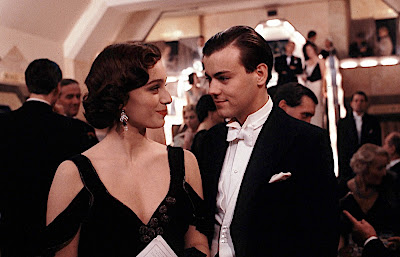Serving up two-- one big and one small-- screen adaptations of scribe Evelyn Waugh's darkly satirical snob-centric twentieth century classic novels, Acorn Media pairs the addictive soap A Handful of Dust with the influentially absurd Scoop in an author-centric boxed set.
And regardless of only boasting two films, which makes the title of the The Evelyn Waugh Collection seem a bit ill-suited, the set makes an excellent companion offering to the other Waugh UK imports of the classic Brideshead Revisited with Jeremy Irons and Sword of Honour with Daniel Craig.
Similarly, although the picture still looks extremely dated even in an upconvert Blu-ray player, the Oscar nominated A Handful of Dust is well-worth the investment since the amusing but under-played Masterpiece Theatre televised Scoop seems like it's a work that's best left to the page as it's missing the superior production value of the cinematic Dust.
No stranger to the complicated humor and style of Waugh-- whose brash, acerbic wit and penchant for the subtlest of allegories can baffle other filmmakers handling the material-- director and co-scripter Charles Sturridge tackled Dust in 1988, after helming what miniseries-wise could be considered UK's version of The Thorn Birds or Rich Man, Poor Man with the epic Brideshead Revisited.
Similar to the way that high caliber films like Bright Star, Coco Before Chanel and The Young Victoria are often merely rewarded with nominations in the design categories a la this year's Academy Awards, so too was Dust following its '88 theatrical run, garnering an Oscar nod for its exquisite costumes that fit the then-brunette breakout star Kristin Scott Thomas like a radiant glove.
Dust is about much more than its costumes, however materialism could be a gateway to greed, which is at the thematic heart of this piece. The film centers on a decent but dull husband and father (Maurice's James Wilby) whose wife Brenda (English Patient's Scott Thomas) begins a passionate affair with a young man whom Waugh saddles with one of his quintessentially bold and borderline silly names of Beaver (The Forsyte Saga's Rupert Graves).
Co-starring Judi Dench, Anjelica Huston and Alec Guiness, the straightforward, polished film still startles because of its unapologetic frankness and lack of motive or responsibility for any of the participants. Although Scott Thomas would eventually play an unfaithful wife later in films like Patient, in Dust we're given little reason why she strays other than the fact that her unadventurous husband is a homebody.
Daringly in-your-face, this decision that may hit some couples right where they live as characters-- including another man who uses Brenda's husband dreadfully-- simply look out for themselves without a care in the world, cheating and manipulating simply because they can.
Yet, intriguingly, Dust never offers any major sense of comeuppance for our leads as-- even following a tragedy of Gone With the Wind proportions, Brenda proves she's crueler than we realized, not wanting to let anything spoil her enjoyment.
In this sense, the author agrees, never letting the story he's telling stop as the fate of Brenda's estranged husband may divide some audience members in the way that it's depicted onscreen verses the book, which Waugh has noted stemmed from the literal and figurative ways that one person can be held prisoner by another for no reason other than their own sense of entitlement.
Although Roger Ebert's otherwise excellent review is littered with so many spoilers that you should avoid it until you've finished the film or at least read the novel, he ends with a thought that keeps in perfect sync with the presentation by noting that “it has more cruelty in it than a dozen violent Hollywood thrillers, and it is all expressed so quietly, almost politely.”
An astute remark for a work which garnered its title from T.S. Eliot's The Waste Land, while it's nonetheless unexpectedly amusing and expectantly baffling as a film, both the final and result and Ebert's observation I'm sure would have fed right into Waugh's intentions.
And that's saying an awful lot since critics-- or more particularly book critics-- in Scoop are viewed with nearly the same regard as the janitorial staff in one of Waugh's most famous novels by the same name.
Although it's not to be confused with the recent Woody Allen magic themed Scoop starring Scarlett Johansson and Hugh Jackman, much like Johansson's eager junior reporter, our protagonist William Boot (Michael Maloney) finds himself in way over his head while chasing the story of a lifetime.
In this pleasant yet minor, perfunctory adaptation, a major misunderstanding finds the good-natured, soft-spoken nature columnist William Boot thrust into the middle of African republic Ishmaelia where he's sent to cover a revolutionary war.
While luckily he doesn't find himself in danger, the unprepared Boot does make the acquaintance of other reporters, government workers, ex-patriots, and a wide array of outsiders you might've found in Paris during the jazz age.
A feisty script and fast-paced director from Gavin Millar helps keep this televised work affloat and while it still strikes an affable chord for those who love the interplay of journalism and politics to be found in movies like Wag the Dog and The Hunting Party, overall, the best scoop to be found in Scoop is to get thee to a bookstore as quick as you can to read Evelyn Waugh's prose.
For, although some of the barbs sting as do the terrific use of unexpected plot payoffs throughout, you just know that you're missing so much humor and wicked narrative structure that would've been more ferociously irresistible on the page.
Text ©2010, Film Intuition, LLC; All Rights Reserved. http://www.filmintuition.com
Unauthorized Reproduction or Publication Elsewhere is Strictly Prohibited and in violation of the Digital Millennium Copyright Act.
FTC Disclosure: Per standard professional practice, I received a review copy of this title in order to evaluate it for my readers, which had no impact whatsoever on whether or not it received a favorable or unfavorable critique.







